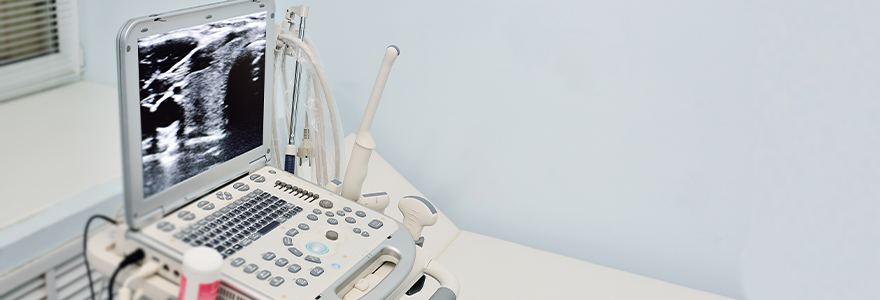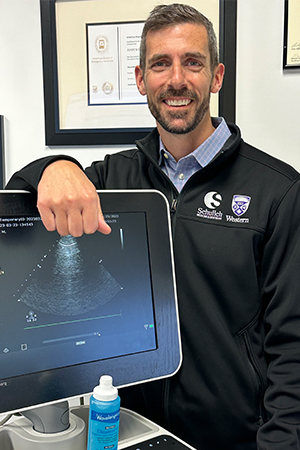Schulich prof develops AI-powered bedside lung ultrasound

By Prabhjot Sohal
Point-of-care lung ultrasound, performed right at the bedside, can be life saving for critically ill patients. It can help diagnose several medical conditions such as pneumonia, pleural effusion and pneumothorax much faster than traditional methods and with little discomfort to the patient. But due to challenges in interpreting the images produced through hand-held devices such as smartphones and tablets and lack of training to do so, there is a shortage of clinicians adopting it.
However, new smart AI-powered solutions are instilling confidence in point-of-care ultrasound technology, encouraging clinicians to use it and investors to fund it.
Deep Breathe, founded by Western’s Dr. Rob Arntfield, is one such medical technology company revolutionizing point-of-care lung ultrasounds.

Dr. Rob Arntfield is Professor of Medicine at Schulich School of Medicine & Dentistry and Medical Director of the Critical Care Trauma Centre at London Health Sciences Centre (LHSC). (Schulich Medicine & Dentistry Communications)
“Deep Breathe is providing the missing link in the wider adoption of point-of-care lung ultrasound. With our groundbreaking suite of AI-powered lung ultrasound applications, healthcare providers will be able to make decisions with greater speed, accuracy and objectivity,” said Arntfield, professor of medicine at Schulich School of Medicine & Dentistry and medical director of the Critical Care Trauma Centre at London Health Sciences Centre (LHSC).
“We seek to open the access of this powerful technology to providers of different skill level and training,” he said.
Deep Breathe has recently secured an external investment to expand its AI-based methods and technology. Led by MAP Equity Investco, an investment firm based in London, Ont., this investment also accelerates important regulatory approval efforts with Health Canada and the Food and Drug Administration to bring Deep Breathe’s technology to the market.
Ultrasound offers a low-cost, highly portable and radiation-free option for medical imaging, yet the medical community still relies on X-rays for lung imaging. Arntfield and his team of researchers want to see that change.
“Despite larger companies dedicating resources to AI and ultrasound, Deep Breathe stands out as the only company focused solely on respiratory and lung ultrasound. Previously, ultrasound was thought to be ineffective in assessing the lungs due to its inability to penetrate air. However, the accuracy of these patterns has been proven time and again, confirming ultrasound is superior to chest X-ray,” explained Arntfield.
Combining the expertise of medical specialists with those of deep learning, computer vision and software engineering specialists, Deep Breathe has shown efficient point-of-care lung imaging is possible using AI. The project has produced encouraging scientific literature related to COVID-19, pneumonia, heart failure, pneumothorax and pleural effusion.
The development of Deep Breathe technology relies on an archive of millions of annotated clinical data – de-identified to ensure patient privacy and security – to train its innovative deep learning models. Deep Breathe has established the world’s largest proprietary archive of annotated lung ultrasound images, spanning more than a decade of clinical investigations.









